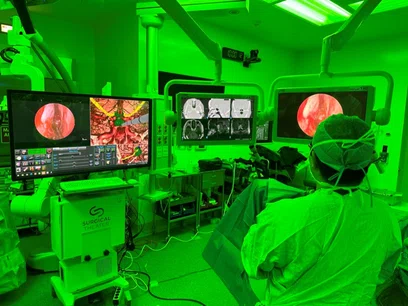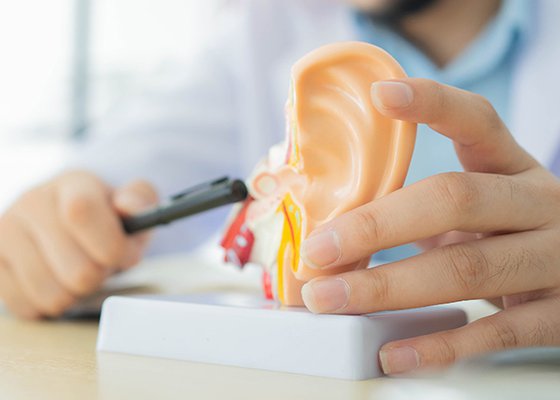

Face to Face
discover the newsletter


March 2023 ENT Newsletter
A Letter from the Chair
Research is more important than ever for today’s medical data explosion
At my recent clinical staff meeting of Houston Methodist’s Otolaryngology — Head & Neck Surgery, we returned to the ever-important discussion of research and how our curiosity can create stronger data to feed the best healthcare option for our patients.
I must admit, the topic of research and the routine steps to create a useful data ecosystem brought grumbles from my clinical staff, a few eye rolls and some definite groans of discontent. I get it. Yes, collecting research feels tedious in a day- to-day schedule filled with so many sick patients in urgent need of attention. We must, however, keep focused on our long-term goal of finding new treatment options for our patients. Keeping a database and learning from our daily interactions with our patients are key.

Mas Takashima, MD, FACS
Clinical trials and data analysis are even more important today in an era where controversial treatments are being espoused publicly based on certain biases. Crucial importance of peer review in doing controlled studies to eliminate bias is so important. We seem to have lost the significance of what peer reviewed, controlled studies really are and how they can bring answers based in data.
Science is rapidly changing, becoming more complex. A single researcher or site doesn’t have enough patients to develop and validate medical innovations or it might take a lot longer to come up with the same results. What’s exciting today is that we have new technologies to allow us to delve deeper and faster into pooled medical databases.
Today’s medical data explosion has made research more important than ever. We now have more searchable database access to help guide our treatments, and we are now using artificial intelligence (AI) to rapidly analyze this information. Research data gives us very important information about disease trends, risk factors, outcomes of treatments, public health interventions, patterns of care, healthcare costs, healthcare utilization and even disparities of healthcare and its delivery. Having a data ecosystem that collects patient’s demographics, patient’s symptoms, treatment and how they respond enables us to search all this information using AI to provide answers where we couldn’t get answers like this in the past.
Our department is currently utilizing REDCap (Research Electronic Data Capture) in combination with Health Data Analytics Institute (HDAI) to take advantage of big data and computational technology. HDAI is analyzing large databases utilizing AI to produce predictive models for different patient treatments and in different patient demographics. So now we can search the data system for best outcomes from more patients and associate their results with hundreds of different variables.
Nationally many academic centers are joining similar consortiums to share data. The time is here where we have the capability to quickly parse through millions of datapoints to analyze and offer the best care to our patients. Yes, data collection does slow down your clinic workflow, but the importance of continuous learning is why we ventured into academics in the first place. It was not simply to treat patients at a high volume. We must be persistent and ever curious. Evolution of our research and improved treatment is at the core of academic medicine. We want the best results for the longevity and quality of life for our patients. We want to always be pushing to the next level of better healthcare. Research will help us get there.
In the course of advancing resident education in a new department in the largest medical center in the world, among generations of experts, visionaries and leaders, my goals must be intentional, well considered and ultimately successful.

ANNOUNCEMENTS
Year In Review
In 2022, our department has added 5 new faculty members, expanding our faculty count to 22, 11 of which are subspecialty trained. As a result, we now have at least 2 fellowship trained faculty in all areas of adult otolaryngology, allowing us to provide fully comprehensive OTOHNS care for our adult community.
LEARN MORE
Thekdi Elected Secretary of the Medical Staff
Apurva Thekdi, MD, recently was elected secretary of the medical staff by his peers.
Dr. Thekdi is a physician on the Houston Methodist Center for Performing Arts Medicine roster who focuses on everything from wellness strategies to complex vocal care and recovery.
LEARN MORE
in the news
Departmental Spotlight
Margarita Rodriguez: A medical assistant of kindness, compassion and devotion
READ MORE

ENT’s First Research Fellow Reflects on His First Year and Looks to the Future
In 2022, Daniel Gorelik became the first Research Fellow in the Department of Otolaryngology-Head and Neck Surgery. As this program closes on its first year, Gorelik reflected on what he has learned the past year and offered advice for incoming fellows and residents.
READ MORE

Da Vinci SP robot provides better outcomes for removal of deep lobe tumors
Dr. Josh Kain is leading the evolution in treating deep lobe and parapharyngeal space tumors with recent successful surgeries using the Da Vinci single port (SP) robot at Houston Methodist’s Department of Otolaryngology — Head & Neck Surgery.
READ MORE
Feature story
3D virtual reality revolutionizes complex operations
Just two years after Houston Methodist invested in state-of-the-art technology to create the Virtual Surgical Theater environment for surgeons and patients to “fly through” a patient’s brain and see the specific tumor that needs to be removed, Dr. Mas Takashima and Dr. David Baskin agree the investment was well worth it for patients, surgeons and for training of future surgeons.


Patients appreciate it; it definitely wows them, but it is far more than that. Patients really understand better. They can see the relationship between the skull base tumor and surrounding important structures such as the optic nerve and carotid artery
Mas Takashima, MD

Read now
Departmental PUBLICATIONS
Click here to see the list of publications from 2022 from our Department.
The Department of Otolaryngology – Head and Neck Surgery
Click here

Departmental Education
Our mission is to provide the best patient care experience while training students, residents, fellows and physician scientists
CLICK HERE

Sign up for The Department of Otolaryngology – Head and Neck Surgery newsletter
Sign up






